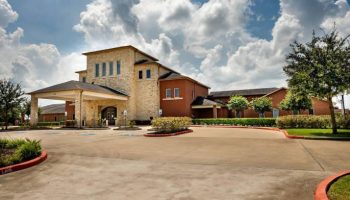About Discovery Point Retreat Waxahachie
Part of the Discovery Point Retreat network, the Waxahachie Rehab Center is about 30 miles south of Dallas, Texas. The ranch-like facility in a tranquil setting provides the perfect arid environment to focus on healing and recovery. They offer a full continuum of care to adults dealing with substance use disorder, from detox to residential rehab, right through to outpatient and aftercare. Discovery Point Retreat accepts most insurance plans and offers free insurance verification to check your coverage.
If you’re entering treatment with a chemical dependency, the first step in your personalized care plan is likely to be a medical detox. You’ll be monitored 24/7 to make sure that your body is cleansed of substances as safely and comfortably as possible. You will be prescribed proven medications that lessen withdrawal symptoms and ease cravings, so you can physically and mentally prepare for the next stages of the recovery journey.
The Waxahachie Rehab Center is set on a ranch surrounded by calming nature, providing a peaceful and homelike environment for detoxing in comfort. The facility is equipped with amenities to support your recovery, including an onsite chef, pool, gym, and a wide range of therapies for when you’re feeling better. If you feel like exploring, there’s a fishing pond and nature trails. Or, you can enjoy a snack 24/7, including freshly baked bread. They have holiday meals, and families are welcomed.
Transitioning directly into residential treatment from the detox program or another level of care offered by Discovery Point, you’ll receive personalized mental and emotional therapy increasing the likelihood of lasting recovery. Services include individual and group therapy using a cognitive behavioral approach, eye movement desensitization and reprocessing, recreation therapy, and equine assisted therapy.
Levels of Care
-
Inpatient
Inpatient and residential programs provide round-the-clock medical and emotional support as you live at the treatment facility. This level of care may be recommended if you have severe addictions or mental health conditions since it removes outside distractions and allows you to focus solely on therapy.
-
PHP
Partial hospitalization programs provide comprehensive treatment in a structured setting during the day but allow you to return home at night. These programs offer a balance of inpatient and outpatient rehab and provide intensive support without full time residency.
-
Outpatient
In outpatient therapy, you’ll attend therapy sessions several times each week while living at home. This is ideal if you have a strong support system and a lower risk of relapse. Outpatient treatment offers flexibility to maintain work, school or family obligations.
-
Aftercare
Aftercare programs provide ongoing support after you complete a rehab program. They may include several components to help you maintain sobriety including therapy, community support groups and relapse prevention strategies. This gives you a network of resources as you reintegrate into your daily life.
-
Dual Diagnosis
Dual diagnosis programs address substance use disorders and co-occurring mental health conditions simultaneously. This integrated approach to care improves the likelihood of long term recovery and stability by addressing the root causes of addiction.
Detox Service Setting
-
Inpatient Detox
Inpatient detox occurs in a dedicated treatment facility. You’ll live there around the clock and receive intensive medical support and supervision to help manage your withdrawal symptoms. It is suitable for individuals with moderate to severe addictions as it ensures a stable detox environment.
-
Outpatient Detox
Outpatient detox gives you access to medically supervised withdrawal services while still allowing you to live at home. You’ll attend a clinic for treatment and monitoring. This flexible option is suitable for those with mild to moderate withdrawal symptoms who have strong support systems.
-
MAT
Medication assisted treatment combines medication and counseling to manage withdrawal and reduce cravings for opioid and alcohol addiction. Medications may include methadone, buprenorphine or naltrexone. MAT is tailored to your needs so you can actively participate in your treatment journey.
Programs
-
Adult (18+)
Adult programs address the substance use and life challenges specific to adults. Therapists can deliver sessions in individual, group and family settings. Services often include job support and life skills training in a structured environment.
-
Alcohol Detox
Alcohol detox programs offer medical support to help individuals withdraw safely from alcohol. Your care team may use medications to ease your symptoms and provide medical monitoring to address complications.
-
Animal Therapy
Animal therapy uses interactions with animals such as dogs or horses as part of treatment. You’ll learn to develop trust, lower your anxiety levels and regulate your emotions. This provides comfort and a sense of companionship during the recovery journey.
-
Cognitive Behavioral Therapy
Cognitive behavioral therapy focuses on changing harmful thought patterns and behaviors associated with addiction. You’ll learn healthier coping mechanisms by identifying and replacing negative thoughts. This improves your emotional resilience and decreases your relapse potential.
-
EMDR Therapy
EMDR stands for eye movement desensitization and reprocessing therapy. It helps you process traumatic memories that may underlie addiction. You’ll learn how to reduce emotional distress and begin healing from past events. This makes it effective for trauma related addiction causes.
-
Exercise Therapy
Exercise therapy incorporates physical activity into treatment to promote mental and physical health. Regular exercise reduces stress, boosts mood and enhances your overall wellbeing. This can give you a positive outlook and lower your relapse risk.
-
Men
Men's programs address substance use while also considering the social pressures, family roles and mental health concerns that are specific to men. You’ll learn healthy coping mechanisms as you build emotional resilience and develop communication skills.
-
Opioid Detox
Opioid detox uses medications to ease severe withdrawal symptoms. It also includes medical supervision to help you manage potential complications. These services allow you to stabilize and begin a recovery plan.
-
Women
Women's programs offer a safe and supportive space to focus on gender specific issues such as trauma, family roles and mental health conditions. Therapists tailor the sessions to address women's needs and foster empowerment in a healing and nurturing environment.
-
Young Adult (18 - 25)
Young adult programs are designed for individuals who are transitioning into adulthood. Topics of discussion typically include identity, independence and peer relationships. Providers may also offer life skills training and career support.
Payment Options
- Private Insurance
- Self Pay
Accreditations
-
 Joint Commission
Joint Commission
Amenities
- Farm Setting
- Fitness Center
- Hiking
- Music Room
- Spa
- Yoga Studio
Contact
530 Hight Road
Waxahachie, TX 75167





